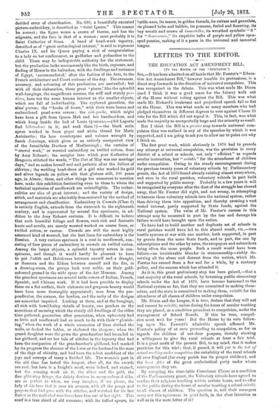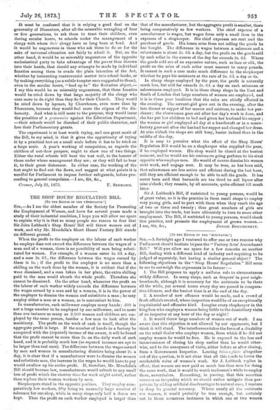LETTERS TO THE EDITOR.
THE EDUCATION ACT AMENDMENT BILL.
(TO THE EDITOR OF THE "SPECTATOR.")
SIR,-It has been admitted on all hands that Mr. Forster's " Educa- tion Act Amendment Bill," however humble its pretensions, is a direct step forwards in the direction of universal compulsion. This was recognised in the debate. This was what made Mr. Dixon (and I think it was a good omen for the future) walk out of the House without voting against the Bill. This was what made Mr. Richard's irrelevant and prejudiced speech fall so flat on the House. This was what made so many members who had pledged themselves in different degrees to vote against Clause 25 vote for the Bill which did not repeal it. This, in fact, was what made the majority so unexpectedly large and the minority so small.
But I think the Bill is a greater step towards universal com- pulsion than was realised in any of the speeches by which it was supported, and I am going to ask you to allow me to point out why I think so.
The first great work, which obviously in 1870 had to precede any attempt at universal compulsion, was the provision in every district of a school or schools, not only " efficient" as regards secular instruction, but "suitable" for the attendance of children under compulsion. Owing to the steady encouragement during the previous twenty years of voluntary schools by Parliamentary grants, the Act of 1870 found already existing almost everywhere, and even in the rural parishes, voluntary schools in part built and supported by public money. Probably in a few years it will be recognised by everyone after the dust of the struggle has cleared away, that Mr. Forster did right, and not wrong, in attempting to harness these voluntary schools into the national system, rather than driving them into opposition, and thereby creating a vast vested interest, partly supported by State funds, against the National system. The value of Mr. Forster's success in this attempt may be measured in part by the loss and damage his failure would have brought upon the nation.
To have had to build another and duplicate set of schools in rural parishes would have led to this absurd result, viz.,—two hostile systems at war with one another, both supported, in part by grants from the same State funds, and in part, the one by subscriptions and the other by rates, the ratepayers and subscribers being often the same people: Such a result would have been faliure—an irretrievable blunder in statesmanship—richly de- serving all the abuse and distrust from the nation, which Mr. Forster has earned from a few and for a while, by a contrary policy, and the success which has attended it.
As it is, this great preliminary step has been gained,—that a vast majority of the rural schools, by becoming public elementary schools under the Act of 1870, have become harnessed to the National system so far, that therare committed to making them- selves, and the state is committed to making them, suitable for the attendance of all classes of children under compulsion.
Mr. Dixon and the League, it is true, declare that they will not and cannot be suitable, unless during the hours of secular teaching they are placed, as a condition precedent to compulsion, under the management of School Boards. If this be true, compul- sion must wait for :rears! But the House by its vote follow- ing upon Mr. Fawcett's admirable speech affirmed Mr. Forster's policy of at once proceeding to compulsion, so far as regards the children of out-door paupers, thereby showing a willingness to give the rural schools at least a fair trial. It is a great merit of the present Bill, to my mind, that it makes provision for this trial ; that, if passed, it will put to the test of actual working under compulsion the suitability of the rural schools all over England (for every parish has its pauper children), and the bona fides of the great ecclesiastical party under whose management they are.
By accepting the time-table Conscience Clause as a condition of the Parliamentary grant, the Voluntary schools have agreed to confine their religious teaching within certain hours, and to offer to the public during the hours of secular teaching a school suitable to all classes of children. The question is, will their managers carry out this agreement in good faith, in the clear intention as well as in the mere letter of it? It must be confessed that it is relying a good deal on the generosity of Dissenters, after all the miserable wrangling of four or five generations, to ask them to trust their children, even during secular hours, to schools under the management of a clergy with whom their clergy have so long been at feud. And it would be ungenerous in those who ask them to do so for the sake of universal education not fairly to admit it. But, on the other hand, it would be so miserably ungenerous of the opposite ecclesiastical party to take advantage of the power thus thrown into their hands, that should any attempts be made by individual fanatics among them to evade the plain intention of the Act, whether by insinuating controversial matter into school-books, or by making everything (as a subtle tempter once suggested to them), -even in the secular hours, " lead up to " the Sectarian object,— I say this would be so miserably ungenerous, that these fanatics would be cried down by that large majority of the clergy who care more to do right than they do for their Church. They would be cried down by laymen, by Churchmen, even more than by Dissenters, because they would feel more the stigma of the dis- honesty. And what is still more to the purpose, they would incur the penalties of a prmmunire against the Education Department, —their schools would be disrobed of their public character, and dose their Parliamentary grants.
The experiment is at least worth trying, and one great merit of the Bill, to my mind, is that it gives the opportunity of trying it by a practical test on a small scale before it has to be tried on a large scale. A year's working of compulsion, as regards the -children of out-door paupers, ought to show one of two things. Either the rural schools will bear the test well, to the honour of those under whose management they are ; or they will fail to bear it, to their great dishonour. In either case, the working of the 'test ought to find out the flaws, and suggest at what points it is needful for Parliament to impose further safeguards, before pro- ceeding to general compulsion.—I am, Sir, &c., Cromer, July 23, 1873. F. SEEBOIDI.



































 Previous page
Previous page